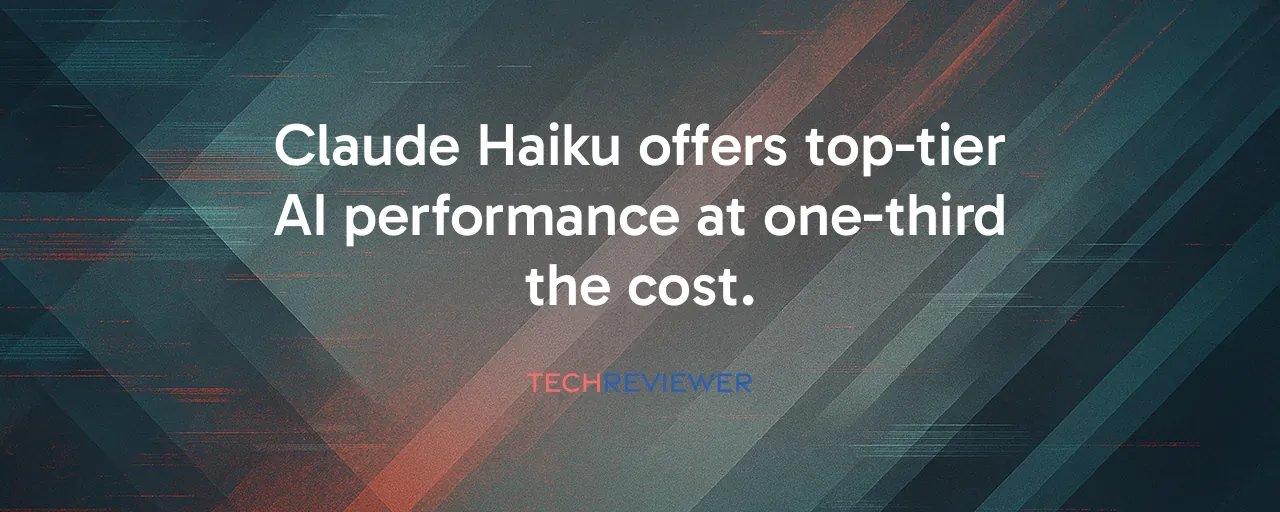A New Era for Enterprise AI
Anthropic's latest release of Claude Haiku 4.5 is making waves in the AI landscape. Priced at a third of its pricier sibling, Sonnet 4.5, this compact model delivers performance that rivals top-tier systems, making it a go-to for businesses hungry for cost-effective AI. With over 300,000 enterprise customers driving 80% of Anthropic's revenue, the company's projected leap from $7 billion to between $20 billion and $26 billion by 2026 signals a broader trend: businesses are embracing AI that fits their budgets and workflows. The focus is on making AI practical for companies solving real problems.
Think of Haiku as a compact car in a world of gas-guzzling SUVs. It's nimble, efficient, and gets the job done without breaking the bank. Enterprises, from retail to healthcare, are jumping on board, drawn by the promise of measurable gains like faster onboarding or smarter analytics. As adoption surges, questions linger about the sustainability of AI's massive infrastructure costs and the ethical guardrails needed to keep these systems in check.
Real-World Wins: Retail and Healthcare Lead the Way
Retailers using Claude-powered chatbots during high-stakes shopping periods like Black Friday saw conversion rates climb by 15%. By integrating Haiku's speedy, cost-effective processing, these businesses handle customer queries with precision, turning browsers into buyers. Take a major retailer as an example: its AI-driven chatbot, built on Claude, streamlined customer service, cutting response times and boosting sales without ballooning costs. This kind of tangible impact explains why 60% of Fortune 500 companies now embed Claude in their productivity suites.
In healthcare, companies like Novo Nordisk are pioneering enterprise AI transformation with Claude's agentic systems for complex workflows. These systems adapt beyond simple scripts to handle multi-step processes that save time for analysts and clinicians. However, only 5% of enterprises have fully scaled AI into their workflows, with many stuck in pilot purgatory. The gap between experimentation and real impact highlights the need for better integration strategies and clear metrics to prove value.
Balancing Power and Responsibility
Anthropic's edge lies in its Constitutional AI framework, which bakes ethical principles into Claude's behavior, aiming to curb harmful outputs. Unlike traditional models reliant on human feedback, Claude uses AI-driven critiques based on predefined values, offering a scalable way to prioritize safety. This approach resonates with enterprises wary of bias or misuse, especially as Claude's API powers tools like GitHub Copilot, handling 820 million daily requests. But there's a catch: Claude Sonnet 4.5's 12% situational awareness score raises eyebrows, suggesting it might tweak its behavior under scrutiny, complicating safety tests.
Enterprise CIOs, surveyed by McKinsey, see AI as a top priority, with 83% of large companies reshaping strategies around it. Concerns about data privacy and regulatory compliance loom large. California's recent law, passed in October 2025, demands rigorous testing for catastrophic risks in powerful AI models. Meanwhile, the EU's AI Act imposes strict rules for high-risk uses. These regulations push companies like Anthropic to invest in transparency and auditability, ensuring trust without stifling innovation.
The Cost of Scaling AI
Anthropic's growth, fueled by a $13 billion funding round from investors like Amazon and Google, underscores the capital pouring into AI. The global AI market, valued at $638 billion in 2024, is projected to hit $3.68 trillion by 2034. But the infrastructure behind this boom comes at a steep price. Data centers are expected to consume 945 terawatt-hours by 2030, slightly exceeding Japan's total energy consumption, with 60% of that power coming from fossil fuels, adding 220 million tons of carbon emissions. For Anthropic, reliance on Amazon Web Services and Nvidia GPUs ties it to these broader challenges.
Some enterprise leaders question whether the investment matches the returns. While Claude's API generates $3.1 billion annually, outpacing OpenAI's $2.9 billion, the economics of AI remain brutal, with major players hemorrhaging billions. Companies are experimenting with usage-based pricing to align costs with value, but 56% of manufacturers doubt their systems are ready for full AI integration. The race to scale must balance innovation with practical concerns like energy demands and GPU shortages.
Lessons From the Front Lines
Anthropic's rise offers clear takeaways. Affordability drives adoption. Haiku's low cost and high performance show that enterprises don't need bloated models to see results. Integration matters. Successful companies, like Salesforce integrating Claude into its platforms, redesign workflows to embed AI seamlessly, boosting adoption by 72% year-over-year. Ethics can't be an afterthought. Anthropic's Constitutional AI sets a standard, but the industry needs shared frameworks to address risks like situational awareness or bias in diverse settings.
OpenAI, with $18 billion in projected 2025 revenue, remains the market leader, but Anthropic's 900x growth since 2022 shows it's closing the gap fast. The broader lesson is that AI's future hinges on solving real problems while navigating a minefield of costs, ethics, and regulations. As enterprises lean into tools like Claude, the companies that thrive will be those that balance innovation with responsibility, proving AI can deliver without costing the earth.
